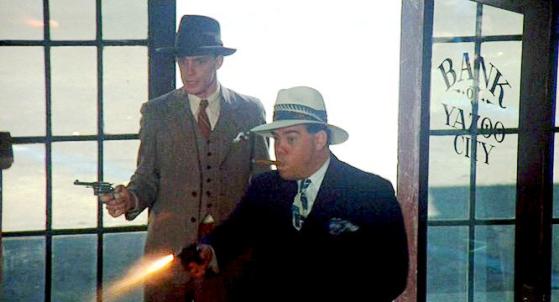 Robert Altman’s account of a gang of hapless bank robbers during the Depression highlights the difference between romantic illusions and sordid reality.
Robert Altman’s account of a gang of hapless bank robbers during the Depression highlights the difference between romantic illusions and sordid reality.
In Robert Altman’s 1974 film Thieves Like Us, three convicts (played by Keith Carradine, John Schuck and Bert Remson) escape from a Mississippi prison during the Depression and go on a bank-robbing spree. Along the way, the youngest thief (Carradine) falls for a shy, gawky girl (played by Shelley Duvall) that he meets at a gas station. But before he can run away with her, there is one last job to pull.
The story is a remake of Nicholas Ray’s They Live By Night from 1949, but Altman’s style and purpose couldn’t be more different than that darkly romantic film. Here the outlaws are portrayed, with startling realism, as brutal, ignorant, and amoral, and the film has an overall tone of deadpan social comedy. By limiting the characters’ psychological horizon to the minimum prescribed by the 1930s American cultural scene, the director achieves a sort of tragicomic determinism. These guys rob banks because they don’t know how to do anything else very well, and society doesn’t really offer them any other way to get ahead. The film’s strategy is brilliant because it manages to tell these people’s stories in a fresh and provocative way, while at the same time wryly commenting on our own (and the characters’) romantic preconceptions that are based on fiction rather than the way people really act.
One of Altman’s main devices is the radio, particularly radio drama, as a counterpoint to the action. Radio was the TV of that era, and the crooks are constantly listening to crime and adventure shows on their car radio—the melodramatic stories and high-flown speech of the announcers on these programs form a delicious contrast with the crude, inarticulate ways in which the real people in the movie actually communicate. This is a vantage point on that era that had rarely been explored on film before—the ambivalent relationship between the common people in the Depression and the messages they were getting from the media, a relationship that persists today in a slightly different form.
The acting, for the most part, is excellent, with Remson’s genially vulgar opportunist a real standout. Although bitterly funny at times, the picture also creates a somber mood that is very affecting. Altman is adept at using long shots to emphasize the characters’ smallness. One bank robbery sequence is shot completely from an overhead angle, which conveys with remarkable clarity the criminals’ emotional detachment. The excellent screenplay, never faltering in its commitment to a loose, non-dramatic approach, is by Joan Tewkesbury and Calder Willingham, with help from Altman. The film failed to find an audience at the time of its release. Perhaps its hope-free vision was just too strong for people to take.
Thieves Like Us is available on DVD.

Fritz Lang’s 1931 crime picture remains one of the greatest depictions of social rot ever put on film. Once in awhile I get asked...

Judy Davis plays the notorious 19th century feminist author George Sand, during a period where she wooed the composer Frederic Chopin, in this sophisticated...

Ruben Őstlund’s latest film savagely satirizes establishment complacency and self-regard, using the theme of modern art to reflect on the porous boundaries between civilization...